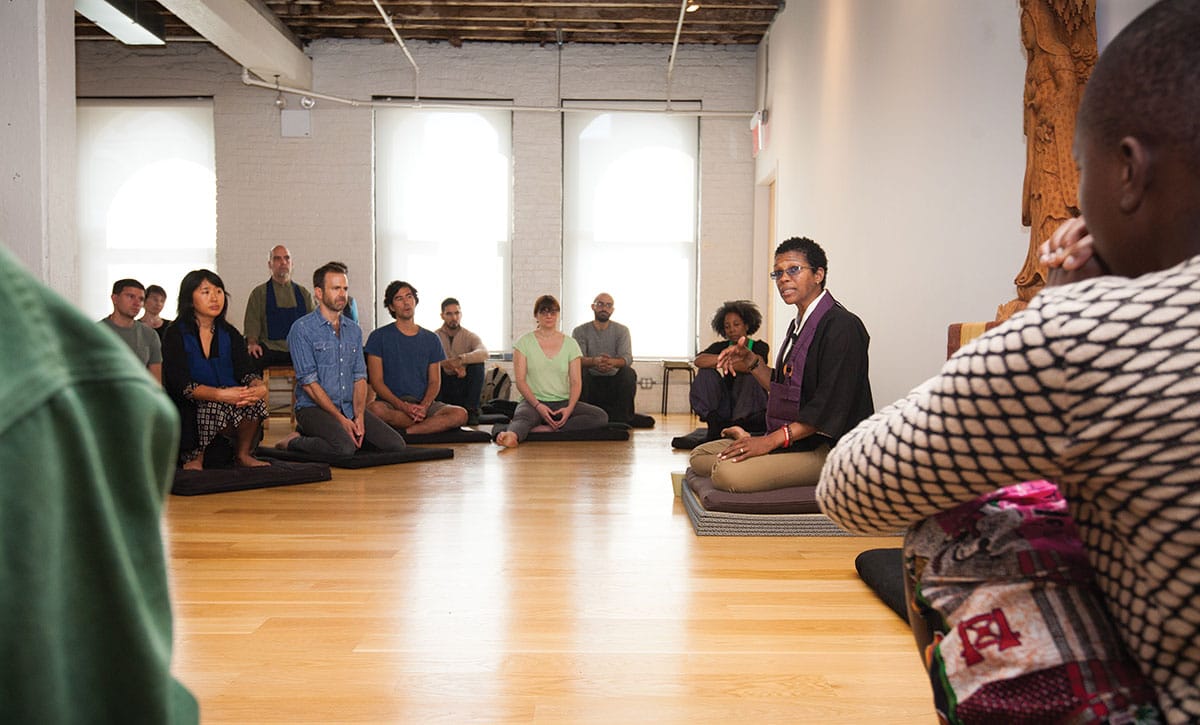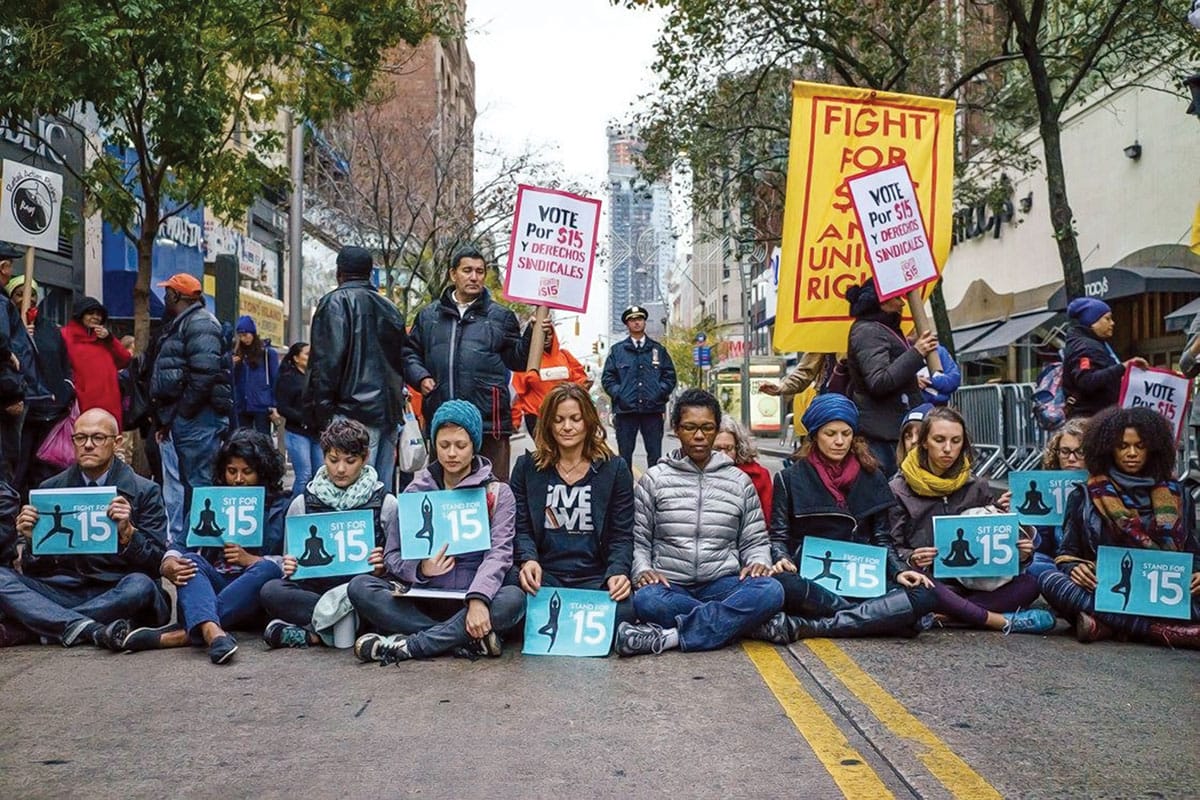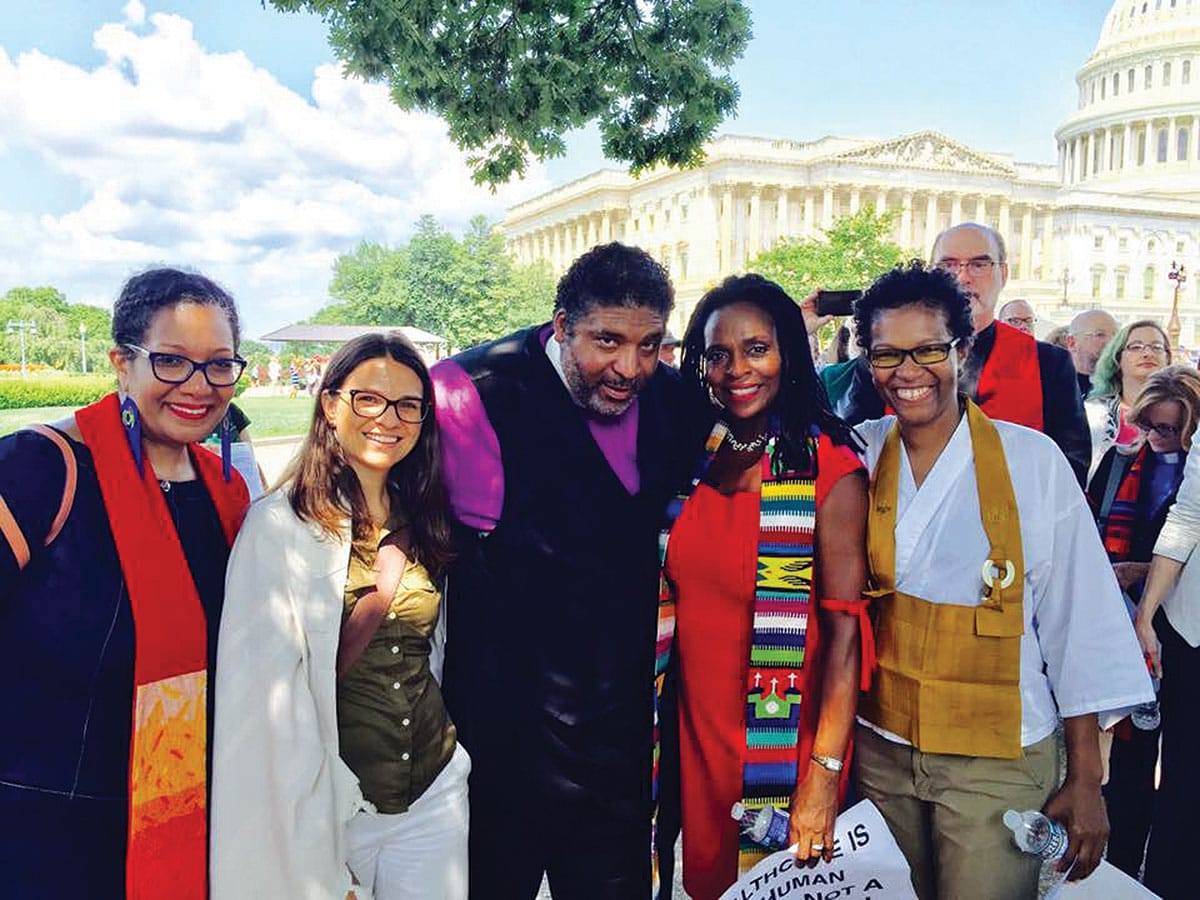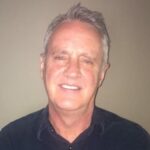She is a well-known author, activist, and one of American Buddhism’s most dynamic and provocative teachers. But once, Rev. angel Kyodo williams was a lonely, bruised little girl living in New York City who would hide her face in a comic book as she walked home from school, avoiding eye contact with those who constantly bullied her.
Comic books allowed williams (who doesn’t capitalize her given or surnames) to escape from reality. Her favorite was the super-powered X-Men, and among this gang of mutants, she felt a particular affinity for the fierce misanthrope Wolverine.
“He was the most suspicious of power in humans and mutants,” says williams. “He was the most immersed in Eastern philosophy. He didn’t like people.”
That she sees this quality in herself may surprise anyone who encounters the engaging and confident forty-seven-year-old. But so much is unexpected about this maverick Zen teacher, a social visionary who has been described as “the most vocal and intriguing African American Buddhist in America.”
That, for example, she once did the books for Queen Latifah’s record label. That at one time williams owned a Brooklyn cybercafé bankrolled by filmmaker Spike Lee and singer Tracy Chapman. That the second Black woman to be ordained as a teacher in the Zen Peacemakers lineage owns a parrot named Mitra (“friend” in Sanskrit), whom she thinks of as a spiritual friend even though his most dharmic statement is “Do you want to go poo-poo?”
There is also the fact that this queer feminist, who writes in her 2016 book Radical Dharma about using love and Buddhist practice as a solution to injustice, also listens to classic hip-hop music, in spite of its often misogynistic lyrics. And that this Zen priest believes she may have an advantage over the real-life Buddha, because he had to leave his palace and go out into the world to learn that life is suffering. “He was shocked by it,” says williams. “But for me suffering was a given. Suffering was my practice.”
Had I not I experienced what I experienced, I wouldn’t be able to see the world the way that I see it.
Growing up in Queens, williams endured years of physical and emotional abuse by a babysitter. Her next stop, Brooklyn, was worse, as the neighborhood kids did not take kindly to her looks or bookish demeanor. At home, williams was a latchkey kid whose father and stepmother both worked, making her a vulnerable target for her building’s pedophile doorman.
In fairness, williams—who declines to give her birth name—has some good memories of growing up with her firefighter father in the culturally diverse LeFrak City housing development in Queens. Her sensibilities were strongly shaped by a place where racial and social differences were a given. “Sameness,” she says, “was never my gig.”
The Buddhist lessons she would one day teach were present throughout her life. At age sixteen williams went to live with her paternal grandmother, just around the corner from the home of her abusive ex-babysitter. Rather than living in fear, she decided to confront the woman. The day she did, Williams encountered “a human being who was wounded and complex” and who, years earlier, had been far too young to be entrusted with a child’s care. “It was a real, dramatic experience of connecting to someone’s humanity and being able to see into people’s suffering,” williams now says.
Looking back on her childhood, she says, “I wouldn’t wish it on anyone else, and I wouldn’t trade any of it. Had I not I experienced what I experienced, I wouldn’t be able to see the world the way that I see it.”
Rev. angel Kyodo williams sees the world from a multitude of angles, starting with her viewpoint as a Black, queer woman who had a traumatic childhood. Williams is also an activist whose politicization can be traced back to Freedom Summer ’92—the inaugural event of the Third Wave Direct Action Corporation, created to mobilize women to become more socially and politically involved—where she worked on a cross-country voter registration drive that helped Bill Clinton get elected.
Then there is williams’ perspective as a Buddhist priest. Rather than renounce the world of politics, political engagement, and activism, she has chosen instead to interweave them into her path as a bodhisattva. “You make an actual vow to hear the cries of the world,” she says, “to step into the experience of awakening to the suffering of the world, and the desire to bring an end to that suffering.”
This past summer, williams and three other prominent Black clergy were arrested in Washington for protesting the Republicans’ attempt to repeal Obamacare, which they viewed as an assault on the poor. Even before that, williams was a regular visitor to the national capital—marching to Washington the day after Trump’s inauguration, leading a busload of Buddhists to the People’s Climate March, and joining a group of clerics marching for better health care.
Love and justice are not two. Without inner change, there can be no outer change; without collective change, no change matters.
“I’m trying to spend my days bridging the disconnect at some of our country’s most intractable and comprehensively impacting intersections,” she says. The intersections williams speaks of include race, the environment, economic disparity, and a host of other intertwined issues that she feels prevent people from reconnecting with themselves, each other, and the planet. “Love and justice are not two,” her website proclaims. “Without inner change, there can be no outer change; without collective change, no change matters.”
Williams is founder of the Center for Transformative Change, which is dedicated to “bridging the inner and outer lives of social change agents, activists, and allies to create social justice for all.”
She is a member of the Auburn Senior Fellows program, a group of prominent faith leaders committed to advancing multi-faith movements for social justice. The Auburn group, The Washington Post writes, “is quietly seeking to bring together a ‘Religious Left’ to counterbalance the decades-old Religious Right by supporting liberal politics with the imprimatur of faith.”
She also works with the Green Leadership Trust, which presses for the inclusion of people of color and indigenous people in environmental issues, and Stand, an organization that pressures companies and countries to alter their environmental approaches.
No wonder she calls her life a “mash-up” of the spiritual and the political. “Buddhist thought,” she suggests, “has been radicalized by liberatory frameworks that are most clearly articulated in Black, radical, antislavery traditions and in feminism.”
Rev. angel Kyodo williams’ Buddhist journey began with a single, small book she found in a San Francisco bookstore when she was twenty-three—the classic Zen Mind, Beginner’s Mind, by the late Shunryu Suzuki. As a child, she had attended Baptist and Episcopalian churches, but Christianity didn’t work for her. After briefly investigating Islam, she soured completely on monotheism.
Soon after reading Zen Mind, Beginner’s Mind, williams started her own “closet” Buddhist practice. Tibetan Buddhism drew her in, particularly the teachings of Chögyam Trungpa Rinpoche, but she found the strain “too white, male, and unwelcoming.” Zen, though, was different. “It was minimal. It was down to essence. It was cut away. I didn’t want more. I wanted less. It was less about being told than it was questions. And I loved the questions.”
Williams’ first formal training occurred at the San Francisco Zen Center. When she moved back to New York, williams heard about Roshi Bernie Glassman and his socially active work at the Greyston Mandala in Yonkers. Connecting social action and Zen appealed to her.
At the Village Zendo in New York City, led by Roshi Pat Enkyo O’Hara, williams discovered something else. “She was queer and there were gay men there. It was like, ‘These are my people.’” Eventually williams was ordained as a Zen priest and as a dharma name she chose “Kyodo,” which means “way of teaching.”
From the beginning, her relationship with what she calls the Western convert Buddhist world was uneasy. “We have a challenge because meditation and mindfulness have largely landed in a privileged community of older white folks,” she notes. In reaction, williams wrote her first book, Being Black: Zen and the Art of Living with Fearlessness and Grace, as an invitation to people of color to embrace Zen.
Yet the problem, williams says, was that the convert Buddhist world did not really welcome people of color or, for that matter, the book she wrote raising the issue. “When the teaching itself is becoming some sort of incarceration, you have to liberate yourself from the teaching,” she says. “You leave the boat.”
So she left the “lineage bound thing” and “started to unfold my own path to follow the truth.” This meant forming the New Dharma Community, which focused, among other things, on the needs of people of color practicing the dharma. With Lama Rod Owens and Jasmine Syedullah, williams co-wrote Radical Dharma: Talking Race, Love, and Liberation as a call to transform sanghas and communities so that queer folk, people of color, and members of other marginalized groups could achieve the healing needed to recover from centuries of social injustice. The book is also an exploration of what it is to practice Buddhism in a society where African Americans are routinely killed by police and incarcerated in vast numbers.
But though williams thought she was done with Zen, Zen was not done with her. A surge in interest in Buddhism by queer and Black folk and other previously excluded groups led williams to reconnect with her original Zen lineage.

Williams is quick to note that this doesn’t mean that she thinks all is right in the American Buddhist world, any more than she thinks all is right with America. The road to liberation is what mainly preoccupies her. If williams has a central lesson for the world, it’s that suffering is the doorway to liberation, and that “by being honestly willing to engage with our suffering, we find our connection to the suffering of the world.”
The trouble with the American Buddhist world, in her view, is that its older, white, male, middle-class adherents find it difficult to connect with the suffering that exists beyond their privileged circumstances.
“I’m obsessed with the question of how we shift that,” williams has said, adding, “There’s something in the way we are practicing Buddhism that actually seems to make us more insulated. Even this practice, which is supposed to be about how we relate to the world and to the people around us, becomes hyper-individualized.”
Williams says now is the time to cut through this. “We can’t let such a powerful tool as meditation be limited by people’s personal circumstances,” she states. “We don’t have the numbers to move this country toward greater social justice if the only driving force is whether or not people are feeling the pain personally.”

Though Buddhism is williams’ practice, when she speaks to people in the African-American community, she doesn’t use traditional terms like the four noble truths. “With all due respect, I don’t care about Buddhism. I’m not nation-building around Buddhism,” she has said. “I just want it to work. I want people to be liberated.”
Instead, williams exhorts the Black community to take the suffering that “has contributed to our great compassion and resilience and beauty” and relate to it in a way that “frees them to be truly who they are.” By doing this, she says, Black Americans gain “access to the full embodied joy and happiness that we are entitled to, not because we are Black, but because we are humans.”
Since she focuses her attention on whatever moves her, williams’ life is peripatetic. Home is Berkeley, where she lives with her fiancée, Elena Margarita Williams. She also spends a few months of the year in New York and the rest of the time is on the road—teaching, speaking, and spreading wisdom any way she can.
Williams acknowledges it’s not a great time to be an American, let alone a Black, queer Buddhist woman. “Is it the land of the free and home of the brave for everyone, or is it the land of the free and home of the brave if immigrants know their place and ‘true’ Americans get what they want?” she asks. But williams is determined to keep walking her path, which is defined by her belief that “our inner lives and social lives are interwoven and interconnected, not just in and of ourselves, but to one another.”
It is a path that requires endurance. Wherever she is, williams rises at quarter to six and does her yoga routine and seated meditation practice. “I feel like I have a living meditation,” she says. “I do formally practice, but I don’t measure my practice anymore in terms of minutes.” Then, she indulges in another important daily ritual, making a great cup of coffee, a holdover from her time at Kokobar, the first Black-owned internet café that she co-owned with Alice Walker’s activist daughter Rebecca Walker.
An avid reader, williams devours The New York Times and publications and books steeped in political subject matter—her future reading list includes Hillbilly Elegy: Memoir of a Family and Culture in Crisis, which seeks to explain the disaffected rural white male voters who carried Donald Trump to the presidency.
“A lot of that disaffection comes from the entitlement that comes with whiteness,” williams says. “They are entitled to this country and everyone else is a user, a stealer, a taker, who doesn’t know their place.”
Yet every moment of williams’ life isn’t devoted to high-minded pursuits. She sometimes finds time for the occasional popcorn movie, like Logan, a recent instalment in the X-Men franchise and a throwback to the comic book reading of her youth. In it, a weary Wolverine—her old favorite—has his plans to hide from the outside world upended when a young mutant arrives needing protection, forcing the cranky loner to fight one last triumphant battle against the forces of evil.
“Who is she?” Wolverine asks another character about the young mutant. “She’s like you. She’s very much like you,” the other character tells Wolverine. As someone who grew up feeling “other” and has made it her life’s work to unseat the systems that create separation, williams is a fan of this movie. “It was terrific,” williams says over the telephone, her faraway voice sounding, for one brief moment, like an eight-year-old girl’s again.

